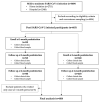Dynamics of Antibody Responses after Asymptomatic and Mild to Moderate SARS-CoV-2 Infections: Real-World Data in a Resource-Limited Country
- PMID: 37104311
- PMCID: PMC10143231
- DOI: 10.3390/tropicalmed8040185
Dynamics of Antibody Responses after Asymptomatic and Mild to Moderate SARS-CoV-2 Infections: Real-World Data in a Resource-Limited Country
Abstract
The dynamics of humoral immune responses of patients after SARS-CoV-2 infection is unclear. This study prospectively observed changes in anti-receptor binding domain immunoglobulin G (anti-RBD IgG) and neutralizing antibodies against the Wuhan and Delta strains at 1, 3, and 6 months postinfection between October 2021 and May 2022. Demographic data, clinical characteristics, baseline parameters, and blood samples of participants were collected. Of 5059 SARS-CoV-2 infected adult patients, only 600 underwent assessment at least once between 3 and 6 months after symptom onset. Patients were categorized as immunocompetent (n = 566), immunocompromised (n = 14), or reinfected (n = 20). A booster dose of a COVID-19 vaccine was strongly associated with maintained or increased COVID-19 antibody levels. The booster dose was also more strongly associated with antibody responses than the primary vaccination series. Among patients receiving a booster dose of a mRNA vaccine or a heterologous regimen, antibody levels remained steady or even increased for 3 to 6 months after symptom onset compared with inactivated or viral vector vaccines. There was a strong correlation between anti-RBD IgG and neutralizing antibodies against the Delta variant. This study is relevant to resource-limited countries for administering COVID-19 vaccines 3 to 6 months after infection.
Keywords: COVID-19 vaccine; antibody response; booster; neutralizing antibody; waning of immunity.
Conflict of interest statement
The authors have no conflict of interest to declare. The funders had no role in the design of the study; in the collection, analyses, or interpretation of data; in the writing of the manuscript; or in the decision to publish the results.
Figures




Similar articles
-
Ad5-nCoV booster and Omicron variant breakthrough infection following two doses of inactivated vaccine elicit comparable antibody levels against Omicron variants.J Med Virol. 2023 Jan;95(1):e28163. doi: 10.1002/jmv.28163. Epub 2022 Oct 1. J Med Virol. 2023. PMID: 36127294 Free PMC article.
-
Real-world serological responses to extended-interval and heterologous COVID-19 mRNA vaccination in frail, older people (UNCoVER): an interim report from a prospective observational cohort study.Lancet Healthy Longev. 2022 Mar;3(3):e166-e175. doi: 10.1016/S2666-7568(22)00012-5. Epub 2022 Feb 23. Lancet Healthy Longev. 2022. PMID: 35224524 Free PMC article.
-
A randomized clinical trial of a booster dose with low versus standard dose of AZD1222 in adult after 2 doses of inactivated vaccines.Vaccine. 2022 Apr 20;40(18):2551-2560. doi: 10.1016/j.vaccine.2022.03.036. Epub 2022 Mar 24. Vaccine. 2022. PMID: 35341647 Free PMC article. Clinical Trial.
-
A cohort analysis of SARS-CoV-2 anti-spike protein receptor binding domain (RBD) IgG levels and neutralizing antibodies in fully vaccinated healthcare workers.Clin Chem Lab Med. 2022 Apr 27;60(7):1110-1115. doi: 10.1515/cclm-2022-0322. Print 2022 Jun 27. Clin Chem Lab Med. 2022. PMID: 35473824
-
COVID-19 lateral flow IgG seropositivity and serum neutralising antibody responses after primary and booster vaccinations in Chile: a cross-sectional study.Lancet Microbe. 2023 Mar;4(3):e149-e158. doi: 10.1016/S2666-5247(22)00290-7. Epub 2023 Jan 27. Lancet Microbe. 2023. PMID: 36716754 Free PMC article.
References
-
- Worldometer COVID-19 Coronavirus Pandemic. [(accessed on 1 August 2022)]. Available online: https://www.worldometers.info/coronavirus/
-
- Lauring A.S., Tenforde M.W., Chappell J.D., Gaglani M., Ginde A.A., McNeal T., Ghamande S., Douin D.J., Talbot H.K., Casey J.D., et al. Clinical severity of, and effectiveness of mRNA vaccines against, covid-19 from omicron, delta, and alpha SARS-CoV-2 variants in the United States: Prospective observational study. BMJ. 2022;376:e069761. doi: 10.1136/bmj-2021-069761. - DOI - PMC - PubMed
-
- U.S. Food and Drug Administration FDA Approves First COVID-19 Vaccine. [(accessed on 14 July 2022)]; Available online: https://www.fda.gov/news-events/press-announcements/fda-approves-first-c...
LinkOut - more resources
Full Text Sources
Miscellaneous

